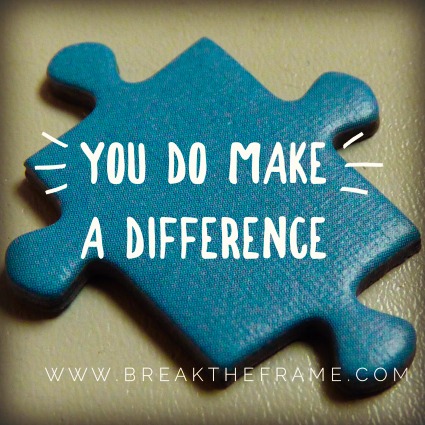John came to talk with me because he was frustrated and wanted to quit his job. He’s smart, driven, creative, and as far as he’s concerned, doing crap work. It felt more like he was tasked with burning a budget instead of making a difference.
John: “I’m creating spreadsheets all day.”
Alli: “Not my favorite either. What are they for?”
John: “I know what I’m analyzing, but I have no idea how they’re used. I’ll bet nobody even looks at them.”
Alli: “Let’s hope that’s not the case…”
John was stuck in his perspective that the work he was doing didn’t matter. The deeper we got into it, it became clear that he thought everyone else was making a difference but him. He was bored; bordering on angry.
This weekend, my daughter reminded me of John.
We bought a new lounge chair and when we opened the box, discovered we had to put it together. My daughter decided that she wanted to help us by putting it together on her own. She dragged it out of the box, spread out all the parts and realized that it wasn’t a solo endeavor.
Fast forward thirty minutes and my husband joined the chair-making party. He read the directions, rummaged through all the parts and finally asked her to hold the back of the chair steady while he tried to attach it to the base.
She was frustrated, bored, and willing to do more. Unfortunately for her, she was stuck holding the back. However, without her, putting it all together would have been impossible. On the surface, it looked like meaningless work, but she was making a difference – a big one.
I chimed in and helped her to understand why her job mattered and how much we appreciated her help. It helped shift her perspective, and it changed her attitude; in addition to the overall experience for everyone involved.
Back to John. Nobody proactively told him how his spreadsheet made a difference and where it fits into the bigger picture. Also, just as important, nobody took the time to recognize his effort and appreciate it. He felt like his work didn’t matter because nobody told him that it did.
[Tweet “Everyone wants to feel like their effort isn’t wasted and they’re making a difference. “]

Wondering if You’re Making a Difference?
1) Schedule a 1×1.
Set up a time to talk about how the work is progressing but also your contribution. Share your concerns and ask about how your effort is influencing the success of the team or program.
2) Ask.
Be brave and ask how you can expand the work that you’re doing even as a special project.
3) Question.
Ensure that you’re clear on the vision and overall path. When you know where you’re headed, it’s easier to understand where you fit and where you’re making a difference or just keeping busy. (PS. Most companies don’t want to simply keep employees busy.)
4) Shift your perspective.
Like John, if you’re in the mindset that nothing you do matters you’re probably angry and frustrated too. What if you had the mindset that you’re playing an important part in the overall program? How would that change your day-to-day happiness and energy at work?
It’s impossible to change the way you see your contribution and how you’re making a difference without shifting your perspective. Think of your perspective as your “way of seeing.” It’s like when you go to the eye doctor and you think your current eyeglass prescription is fine until you realize that everything’s been a little blurry. A new prescription not only makes things sharper but also brings what was previously invisible into focus.
[Tweet “Feeling stuck, frustrated and angry? Start to get unstuck by changing your perspective.”]
The bottom line is that while you may not be doing the “sexy” work, you may be making a bigger difference than you think. When you can only see one piece of the puzzle, it’s impossible to see how it all fits together. However, without all of the pieces, it will never be finished successfully. Take the time to understand your piece of the puzzle and the big picture too.
BREAK THE FRAME ACTION:
Want to shift your perspective? I use several techniques with my clients to help them shift their perspectives. Here’s a quick and dirty version of one of them that will work for you.
Try this easy activity:
1) Write down your current perspective on your issue – Name it. (John’s original perspective was: “Crap work.”)
2) Take 60 seconds and jot down what it’s like to show up day after day with the perspective you’re currently holding. (John’s words were angry, uninspired, bored…)
3) Pick another perspective – an opposite perspective to your first. (John’s was “The Hub” i.e. the center of a wheel)
4) Take 60 seconds to fully step into your new (opposite) perspective and jot down what it would be like to show up day after day if it were your reality.
5) Pick a third perspective and name it.
6) Step into this perspective and jot down what it would be like to show up in this perspective.
7) Pick one and make the conscious choice to hold this as your fresh “way of seeing” and way of being. (hint: probably not the first one that’s keeping you stuck and dragging you down).
What have you done when you’ve felt like you weren’t making a difference to change your thoughts and circumstances?



Great tips for getting “unstuck” Alli. You have tapped into an important issue — the “you matter” need — and you’ve done it from a new angle.
Tangible steps for people to see how they make a difference.
Bravo!
Kate
Thanks, Kate! Knowing how we fit, matter and make a difference is a game changer. We go from being victims to empowered…
Grateful!
Alli
Shifting mind set, changing gears, moving forward. Yes! I was “stuck” in a place that was a terribly dysfunctional organization and I had some rather top-level responsibilities. The kind of difference I wanted to make was not welcomed as I wanted to help the place change dramatically and the rank and file would have none of it. My thought was, “what a miserable year this is going to be.” So, I changed my “mind-set” and figured out a way to help a few others without getting embroiled in too many disagreements and arguments with those who were not going to change. I learned a tremendous amount and I left at the end of year one in spite of being asked to stay on and help. I ended up making a difference but the environment was intolerable.
I can relate. I’ve sucked it up, shifted my perspective and stuck it out, made a strong impact, and eventually the right thing to do was to leave anyway. It made a huge difference to remember that I was not stuck there but chose to be there. Thanks for sharing your experience too.
Alli
OK, here’s my situation … I am retired – no company / organization, no boss / leader. No one for a 1:1, no one to ask or question! I believe I have contributions to make that will matter – but I honestly feel I DON’T MATTER. I have essentially separated myself from education topics (no longer banging my head against the Wall is sooooo… much better).
I have great family that are my first priority. I have great friends near and far which are my second priority. And attention to my fitness and hobbies are an important priority. I have a small but important group of social media “e-colleagues / e-friends” that are another priority. So my life is not empty or dull (yes, I do often wonder how I ever managed a tenured faculty position …).
BUT I still want to matter to someone / some organization just a little bit at least!!! From this post, I still can (AND AM) working on your #4 – Changing my perspective. This is through my developing my personal vision along the path outlined and demonstrated in “Full Steam Ahead” by Blanchard and Stoner.
As noted this is underway. Big stumbling block: Should mattering in leadership circles and maybe back in education circles be part of that vision? I gave up on education because too many had no time for exploring the change I (and many others) believed important AND I am not actively involved in facilitating learning. In the leadership circles, very few people know me and therefore might care what I have to offer.
If you’re still reading this from me, thanks. If you or other readers have suggestions / feedback to offer, it will be very much appreciated.
Finally, let me be clear: This is NOT an EGO thing for me … I believe I’m being honest with myself in truly wanting to matter at least a little bit now in my Emeritus time.
John,
I have so much I want to say to your comment here and actually have been chewing on the words for a few days. Email coming your way very soon.
Alli
Love this post Alli!
I especially like the way you empower each of us to ask “why” we are doing something. I work with many leaders and often encourage them to share with others the big picture of the projects they are working on. But you are so right that if we don’t feel like we are making a difference it is important to speak up and ask.
Thanks Alli and will share!
Knowing that big picture really does make a difference for everyone. Thanks for consistently getting the message out there in your workshops and coaching!
Alli
The victim response isn”t helping anyone. Without learning to take responsibility for our lives, we”ll never get far. I know a few people who LOVE to paint themselves as the victim and struggle to see how they play a part in failure, success, happiness you name it. Time for a change. Thanks, LaRae! Alli
Reminds me of a quote (back when “dirt was clear” – remember … so long a go, wasn’t dirty yet; no recollection of the quote’s source – sorry) I saw and have shared / Considered often since: “Imagine putting a puzzle together without having the ‘picture on the box.’” Indeed, I don’t think anyone would suggest the picture makes things easier. As an aside, I’ll note I have seen puzzles for sale that indeed come with no ‘picture on the box!’
The visualization of the outcome is so very important. I like also to remind myself (and others) that the planning should be focused on the first few steps, NOT on the entire procedure to the desired outcome. For certain, unforeseen and unpredictable things will happen that make the time spent on the full plan wasted. Self-assess and Consider how things are going regularly, adding the next steps that make sense at that point.
Back to the puzzle assembly, probably makes sense to find and assemble the border pieces and to gather pieces that likely go together (e.g., color or pattern). But looking at the ‘picture on the box’ and working before starting to devise a full step-by-step procedure to complete putting the puzzle together makes no sense!!!